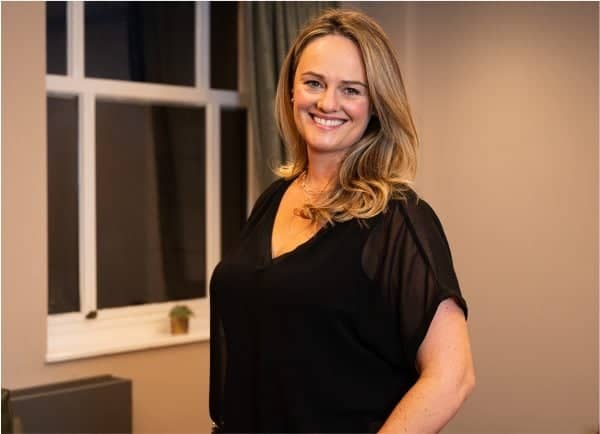Bussiness
Louise Archer, founder of Retrained Search, reflects on the greatest ssues business leaders will face with recruitment in 2025 – London Business News | Londonlovesbusiness.com

2024 has been a more positive year for the UK recruitment industry, following its 3% decline in 2023 driven by reduced hiring activity. However, as UK business leaders now consider the potential impact of the recent autumn budget and additional tax implications, it will be interesting to see how the sector evolves over the next 12 months.
Here, Louise Archer, founder and CEO of recruitment training business, Retrained Search, reflects on what inspired her to launch her own business and how she is working hard to transform the future of the recruitment industry, while ensuring business leaders understand the true value of working in partnership with recruiters through a retained search model.
What inspired you to launch Retrained Search and how has it evolved over the last 6 years?
I founded Retrained Search in 2018 with a clear mission: to help recruiters and recruitment teams secure committed clients, forecastable revenue and 95-100% fill rates, by moving them from a no-win no-fee contingent model to a paid upfront retained partnership model; all using a proven system that is easy to follow and it works, without the need for expensive tools or software.
After years of working as a contingent recruiter myself, I saw firsthand the frustration and instability that came with the model. Consultants would put in immense effort without any guarantee of a fee, often feeling undervalued and used by clients. I knew that if more recruiters could transition to retained search, they could elevate their careers, increase their job satisfaction, and, importantly, create more predictable revenue.
My turning point came when I successfully transitioned my clients to retained and helped my former company, Airswift, build a retained function from scratch, ultimately generating over $12 million in retained revenue. That experience confirmed the potential of retained search not just to benefit consultants but to create stronger, more strategic partnerships with clients.
Over the past six years, Retrained Search has grown and evolved tremendously. We started with our Search Foundations program, which focuses on helping recruiters refine their sales and delivery processes to consistently win retained work. To date, over 1,500 recruiters have completed this program, and the results have been incredible.
As our community grew, so did the needs of our clients. Many were thriving in retained search and ready to take their businesses to the next level, which led us to launch Search Mastery, followed by our own Retrained Marketing and Automation program, which helps recruiters establish a robust digital marketing engine that drives inbound leads specifically for retained work.
Our journey hasn’t just been about teaching the technical skills needed to succeed in retained search; it’s been about building a global community of recruiters who are now advocates of this transformative approach. Together, they’ve shown that retained search can work across industries, levels, and markets once thought unsuitable for a more structured approach.
We’re proud to have built a brand that recruiters trust and rely on, backed by an international base of customers and advocates. This community has helped solidify Retrained Search as a global force, proving that retained search has the power to revolutionise recruitment agencies around the world. Looking ahead, with an estimated 3.5 million recruiters worldwide, we know there’s still a long way to go. But we’re excited to keep expanding our impact, helping recruiters maximise profits, results, and, most importantly, their happiness in the profession.
What prevents recruiters from operating on a retained basis? And how do you feel your approach could shape the future of the recruitment industry?
One of the primary obstacles we hear from contingent recruiters interested in our Retained Search program is, “I’d love to do the program, but I’m just too busy right now.”
Many of these recruiters are overwhelmed, spending their time working on roles that may or may not result in a fee. They’re too occupied with contingent projects to learn how to secure work on a retained basis—ironically, the very approach that could relieve this cycle of uncertainty.
Another common belief holding recruiters back is the assumption that retained search won’t work in their specific market or at the level they typically recruit. However, we’ve consistently demonstrated that retained search can add immense value across a range of markets once considered “unfit” for a structured approach. In fact, these markets often have less competition, offering recruiters more opportunity to delight clients with a premium retained service.
In the past, retained search was predominantly viewed as an exclusive, high-end service reserved for executive search firms. But today, retained search has become a necessity for securing top talent at all levels, especially as clients prioritise hiring the best person for the role. If your mission is to help your client bring on the best talent available, retained search becomes not just a service but a commitment—a moral obligation.
Selling retained search is easier said than done. Clients might wonder why they should deviate from the industry norm and commit to a retained agreement. At Retrained Search, we take inspiration from Simon Sinek’s ‘Start with Why’ philosophy: “People don’t buy what you do; they buy why you do it.” Understanding and articulating your own “why” can transform client relationships. When you genuinely care about your client’s long-term goals, you’re able to position yourself as a trusted advisor rather than just a service provider. This pursuit of genuine relationships over transactional gains is the heart of successful retained search—and why we believe in a moral obligation to this approach.
Why do clients need retained search? It often comes down to leadership’s vision for the long-term success of their organisation. While contingent recruitment tends to operate at a transactional level, retained search addresses challenges that resonate with leadership, elevating recruiters into strategic problem-solvers who naturally become partners at higher levels within the organisation.
The limitations of contingent recruitment have also become apparent in today’s market. In the past, contingent recruitment could reliably yield ideal candidates, but now it reaches only about 30% of potential candidates. The market has evolved, and the contingent model has struggled to keep up. Retained search, on the other hand, offers a sustainable, partnership-driven approach that better aligns with clients’ strategic hiring goals.
At Retrained Search, our approach is not just about teaching recruiters the mechanics of retained search—it’s about transforming how they view their role in the industry. We’re shaping the future of recruitment by empowering recruiters to move from transactional, unpredictable work to a value-driven, strategic service. Retained search doesn’t just change how you recruit; it changes the quality of the relationships you build, the level of roles you attract, and ultimately, the impact you can have within the organisations you work with. For us, this approach is key to ensuring that recruitment remains not only relevant but essential in helping businesses secure their futures in a changing world.
Do you believe the business community truly values the recruitment industry? If not, why/what needs to change?
The recruitment industry is often undervalued, with the business community viewing it primarily as a transactional service rather than a strategic partner. This perception largely stems from the prevalence of contingent models, where recruiters compete to fill roles quickly, leading to rushed hiring processes and inconsistent quality.
This is precisely why I am so passionate about advocating for retained search services. The industry needs to elevate its standards by prioritising long-term, retained partnerships that emphasise quality over quantity.
By transitioning to a model where recruiters act as trusted advisors, equipped with a deep understanding of their clients’ needs and company culture, the recruitment industry can showcase its strategic value. Consistently delivering high-quality hires and fostering relationships grounded in mutual success will reshape how the business community perceives us.
Interestingly, even clients who may seem resistant to shifting to a retained relationship often come around. When they experience the exceptional service and tangible value we bring to their business, it transforms their view of recruitment. This shift not only enhances the way recruiters are valued but also creates a win-win situation for recruiters, clients, and candidates alike.
Taking the recent autumn budget into account, what have been the greatest issues UK business leaders have faced in 2024 and how do you see these challenges evolving – if at all – in 2025?
While the market struggles in 2024 have eased somewhat, many businesses still exhibited a reluctance to hire this past year, largely due to ongoing economic pressures. These factors, exacerbated by the recent autumn budget, have resulted in tighter budgets and more cautious financial planning across various industries. Consequently, companies have become increasingly selective in their hiring processes, often delaying recruitment or focusing solely on critical roles to maintain cash flow.
However, this hesitation has also fostered a growing openness to retained search, extending beyond traditional executive-level placements. As organisations seek reliable, high-quality solutions to fill key positions efficiently, the demand for retained search services has risen. Moving into 2025, we can anticipate that businesses will continue to carefully evaluate each hire, making it essential for recruitment professionals to emphasise value-driven, partnership-based services that align with their clients’ strategic priorities.
An emerging trend we’re observing is the adoption of retained search for less senior roles. Contrary to common assumptions, searches for these positions can be more challenging than those for executive-level roles. Clients maintain high expectations for quality, yet the candidate pool is broader and often less selective, requiring additional effort to curate a shortlist of exceptional candidates. Moreover, engaging candidates for less senior roles can be more complex, necessitating that recruiters invest more time and skill to build strong pipelines.
What have been your greatest challenges to date and how have you overcome them?
One of my greatest challenges has been transforming in-person training into bite-sized online content. This process required significant effort, taking three months to script, film each video, and build the e-learning platform. The transition was essential to make the training more accessible and engaging for our audience.
Following this, I faced the challenge of marketing my new venture. Although I had an extensive network, I needed to effectively communicate what we were doing amid the overwhelming noise of the pandemic. To tackle this, I enlisted the help of a former colleague who specialised in digital marketing. Their expertise proved invaluable, and they have since become a key part of our team as a shareholder and director. This collaboration has played a crucial role in expanding our reach and ensuring our message resonates with potential clients.
You recently achieved impressive growth after expanding Retrained Search into the US and Australia. What has been key to this growth and what is next for the business?
This year, I joined the Goldman Sachs 10,000 Small Businesses program, which has provided valuable clarity regarding the future direction of my business.
We’ve worked diligently to build a strong team that can drive our growth forward, but our current focus is on precisely targeting the right individuals who will thrive in our program, as well as identifying geographic locations with high potential for success.
To date, we’ve primarily expanded in the US, and Australia, thanks to the unwavering support of our advocates and partners, who have played a crucial role in establishing our brand presence in these markets. Our active participation in events in Australia has significantly boosted our visibility, and we aim to replicate this success in the US next year.
Our main objective is to demonstrate to recruiters worldwide how transitioning to retained search can transform their operations and enhance their effectiveness. We have already proven our process in these countries, and now we will focus on employing various marketing strategies to credibly convey the value of this recruitment evolution, which has the potential to change the industry’s perception and operational landscape.
Additionally, we will concentrate on expanding our Retrained Marketing and Automation and Search Mastery programs. We’ve identified a substantial need for enhanced business support among recruiters, and we are well-equipped with the coaches and resources necessary to help them succeed, even in challenging times. Within these programs, we plan to introduce new partners and suppliers to further assist our clients. For instance, Paul Press, a former customer who transitioned from contingent to retained and now secures $3 million in annual retained search revenue, will be coaching and supporting our members to achieve similar success.
Our marketing program is also experiencing rapid growth, with plans to add more content to support our members, along with additional coaching and resources. Although this initiative is relatively new for us, we envision it as an evolutionary step in our Search Foundations members’ journeys, as many of them seek marketing support and guidance.
In summary, over the next five years, we will focus on enhancing our offerings, expanding our reach, and improving the overall experience for our customers, ensuring they have the tools and support they need to excel in the evolving recruitment landscape.










